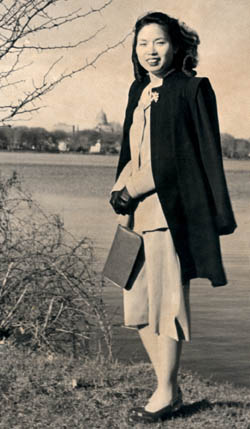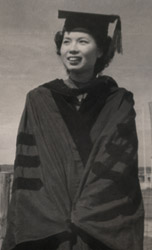
Chueh Ying Shih earned her PhD from the University of Wisconsin-Madison in 1952.
She was a woman who made a perilous journey to freedom and eventually earned a PhD. She valued higher education as the key to a better life, and she encouraged her children to earn their own professional degrees.
She sponsored more than 20 relatives in their quest to come to the United States for graduate university educations. At the end of her life, her story so inspired MBA students at the Harvard Business School that they made an unexpected collective gift to the institution at which she earned her PhD, the Wisconsin School of Business.
By just about any measure, Chueh Ying Shih (’52 PhD BUS) was a remarkable woman. That her tale would provoke spontaneous philanthropy on the part of his graduate students pleasantly surprised her son, Willy C. Shih, professor of management practice at the Harvard Business School.
“Every once in a while, young people do something that restores your faith,” he said. “It’s touching.”
Chueh Ying Shih left Nanjing, China, shortly before the Japanese invasion at the start of World War II. “She told me that the blood was running deep in the streets,” Willy Shih said in a letter than accompanied the $515 check from his students. “Traveling inland with many other refugees, she spent much of the war years in the wartime capital, Chongqing.”
“Every once in a while, young people do something that restores your faith. It’s touching.”
Willy C. Shih
As the war wound down, she traveled over the Himalayas to India, then to Australia. She reached Los Angeles months later. “She had to travel separately from my father, but they met up again in America,” Willy Shih said. “She used to tell me about her father. He always told her to better herself, so she would not have to depend on anyone for her well-being. This is when she was a teenager in the ‘30s in China. Even today, that is not the message most young women in China get. Her father was well ahead of his time in that way.”
She eventually enrolled at the University of Wisconsin-Madison, “which was gracious and generous to both my parents,” he said. Her dissertation in what was then the College of Commerce entailed “An Actuarial Analysis of the American Old Age and Survivors Insurance System,” which would become Social Security.
Willy Shih and his sister were born at University Hospital in Madison and lived in Badger Village. “We were the reasons my parents stayed in the United States,” he said. The family eventually moved to Milwaukee and then Chicago. He did his undergraduate work at the Massachusetts Institute of Technology and earned his PhD from the University of California, Berkeley.

Chueh Ying Shih is seen here on her commencement day at the UW-Madison.
“My mother was always telling me that I needed to get my PhD,” he said. “There was never much doubt that I would go on to graduate education.”
When China opened after Richard Nixon’s diplomatic visit in the 1970s, Shih’s mother, father Ko Ching and sister returned to the mainland. “My mother started sponsoring other relatives to come to the United States to study,” Willy Shih said. She had conditions they had to meet: They had to have their undergraduate degrees; they had to be able to manage English, and they had to be accepted into graduate programs.
“She would help them with the paperwork and get them sponsors, those sorts of things,” he said. “She must have helped 20 to 25 people over the years,” and they attended predominantly state universities in states such as Idaho, Iowa and Texas.
After earning his PhD, Willy Shih worked in private industry for 28 years before entering academia. He spent 14 years at IBM, and while running Kodak’s consumer digital division, he headed the team that introduced the first 1-megapixel digital camera.
He took his position at the Harvard Business School in 2007. “If I had made a plan to be here, I would not have been able to do it the way I did,” he said. “My mother always dreamed of me having a faculty position. Doing that at a major university was never in my plans. When I finally did it, her health would not allow her to appreciate it.”
On the Friday before his mother died, doctors removed her life support just as his class was beginning. Willy Shih flew to California after class and spent the weekend at her deathbed. “I was at least able to say goodbye while she was still conscious,” he said.
She died that Sunday, and he was back in class on Monday. He told his students about his mother’s journey and how she would approve of their getting as much education as possible. “I particularly spoke to the young women in my class and passed along her counsel,” he said.
He was overcome with notes, letters and prayers of support, and Section B of the Harvard Business School Class of 2011 took up a collection. “They told me, ‘We really believe in what your mother said.’” Two days later, they handed him an envelope of money and told him to use it where it would do the most good, so he sent it, along with the story, to the UW-Madison.
“Especially today, when so many things seem to have gone wrong with the world,” he said, “I found this selflessness from what I hope will be future leaders of business and society truly inspiring.”
